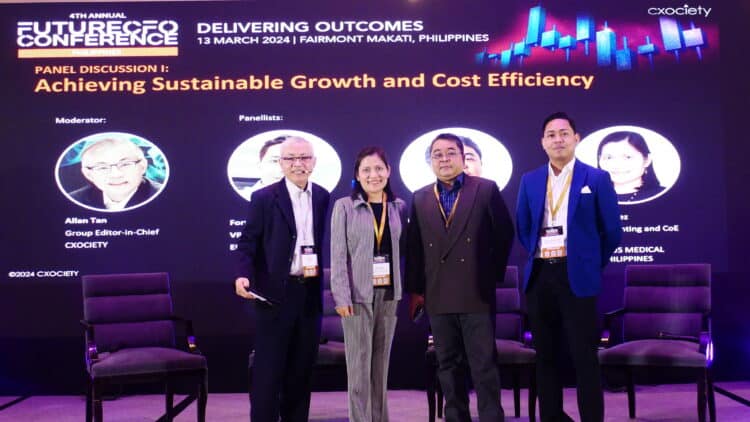The future starts today, not tomorrow. The future is now.
With the future of finance circling the management across functions, the formation of the right concoction of capabilities, and the establishment of a strong data foundation, it is expected that finance leaders look into strategies to not only succeed but also sustain transformative leadership.
On-going FutureCFO dialogues with finance leaders across the function reveal a continued commitment to drive growth amid the challenges of today.
With this at hand, over 200 senior finance leaders in the Philippines converged on March 13 for the Fourth Annual FutureCFO Conference to discuss some of the most critical issues that impact the finance function, as well as the businesses in the country in general.
Transformation and digitisation
Time and again, the business world hears about the latest buzzwords in the market, with a promise of making things easier while driving growth and value for the organisation. While these work for the better, some undeniably pose risks and uncertainties in the operations and business processes.
That is why embarking on the digitisation journey requires effort, research, and careful decision-making.
Among the various technological advancements out there that are relevant to the finance function is automation, considered as one of the main strategies that will be important for sustainable growth in 2024.

Hazel Nunez, CoE Accounting and CoE ICS Lead, Fresenius Medical Care Philippines, believes that using these systems depends on how these add value and help the company in its processes, as some of these technologies tend to complicate procedures.
“We always have to do it in a manner where the system will work for us,” Nunez says.
Jose Petronio Español III, CFO, Treasurer and CRO, Figaro Coffee Group, shares the same view, saying automation and digitisation are vital for the organisation. He also points out that making one’s competitive edge mobile, agile, and fluid is essential for sustainable growth.
Customer experience and technology
Among the many challenges finance leaders face today include overall macroeconomic conditions, increased interest rates, rising capital costs and geopolitical challenges that concern many senior finance executives in 2024.
Finance leaders are under great pressure to bring costs down to anticipate volatile business landscapes in the coming years and yet, are also tasked to preserve profitability for the business.

As for what leads to an organisation’s success, Fortune Ernest Jose, VP for Finance & CFO, Enderun Colleges, believes that the path towards sustainable business growth lies in customer experience.
Jose also notes on the strong push for artificial intelligence, particularly generative AI (GenAI), in 2024. “In order for us to be competitive and relevant in the market, I think companies should be able to position themselves strategically to be able to capitalise on that capability,” he points out.
Meanwhile, to leverage investments in technology such as AI within the organisation, Jose explains that CFOs must foster collaboration within various departments. At the same time, he believes that the finance function should make everyone be prepared for the changes happening outside of the company.
“We all know that the market keeps on changing, so there should be a constant discussion with all the departments about these changes,” says Jose.
Español, on the other hand, points out that CFOs must take the lead on the automation of various processes in the different departments to identify and implement sustainable cost-reduction initiatives.
“Where should we start? Start by making everything a routine.”
He says that even the decision-making and the creative parts of the company can be routinary before being able to automate them, adding that they should be able to ensure that all the needed internal controls are present in the automated process.
Eye on ROI
As part of the business, it is a given that finance leaders must always be carefully monitoring the return on their investments.
“With regards to ROI, of course, no one wants to make a business without income,” Nunez says. “That makes the business sustainable.”
She explains that when talking about ROI, this always has to be relevant or about what the stakeholders would want, as this is because there are some businesses which one may think or consider to be profitable and yet they are closing.
She notes that this is because shareholders demand more income.
“It depends on the risk that the shareholder would want,” she says, explaining that the opinion of the shareholders is part of the package as it will be part of the portfolio.
“It always boils down to ROI.”
The measure of sustainability
For Español, the measure of sustainability lies in three major resources: cash, data, and people.

He retorts that cash is king and data is queen but points out that the most important resource is the people as they are the aces.
The Figaro Coffee executive also stresses the significance of measuring sustainability based on the metrics and key performance indicators, as these are the markers that chief financial officers have control of.
He explains that focusing on these metrics can make big changes within the organisation as this has been one of the processes they went through and has proven true in their company over the past few years.
“We need to increase our efficiency because of the volume requirement,” Español notes.
Employing sustainability measures
Nunez explains that the concept of sustainability in today’s market pertains to meeting current needs and making a profit without sacrificing future profits. This is why currently; the whole sustainability game poses an extra cost to the organisation.
She says that they have to ensure that the company is still profitable even if they are employing certain sustainability measures. At the same time, they have to see to it that the company is compliant.
For this matter, Nunez stresses the importance of properly communicating with shareholders and informing them of what the company will have, as well as the benefits of implementing certain sustainability programs.
Risks
On the road towards transformative leadership for growth and value, financial leaders undeniably face risks, especially in the face of technological advancements that come left and right.
For Nunez, in considering the implementation of cost-efficiencies for sustainable growth, CFOs must be aware of risks concerning the buy-in of the management and the employees as the latter will be the ones implementing the sustainable measures at the end of the day.
“The management will just give the guidance, but the full implementation will be [on] the employees,” Nunez says.
She adds that financial heads must be aware of compliance risks that come along the journey towards sustainability, highlighting that these should be taken into account as they can be costly if overlooked.
Español, meanwhile, adds that the best way to address such risks is to be prepared.
Advice
In dealing with the challenges ahead to reach growth and drive value, including the hurdles in the new technological development in the market, Nunez advises financial leaders to look into the cost of such technologies and how they will be profitable in the long run.
She adds that it is important for organisations to have a skills assessment of the current workforce because these new advancements are what the employees will be adopting.
Meanwhile, Jose says that the basis of all transformation will be the impact on its customers, highlighting that it is imperative to consider whether or not the technological advancements will enhance their experience.




